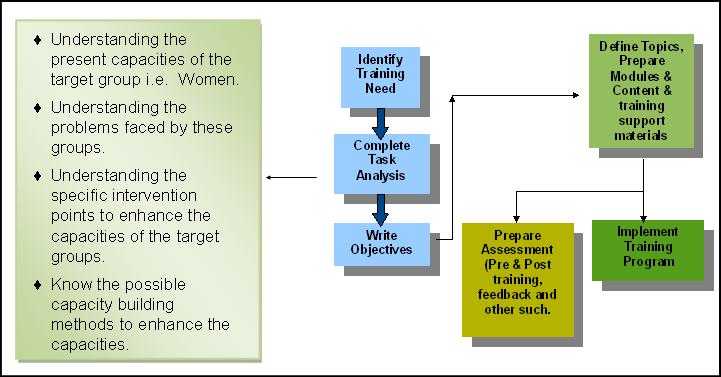Rural Women in Habitat Services:
Training and Capacity Building
C
urrent Scenario and scope of women empowerment through skill development:Though women in the Indian construction sector have contributed equally, they have not been considered for skill enhancement or for improving technical and entrepreneurial capacities. This is applicable in both rural and urban situations. In rural situations, the distinction is stark as women’s role in construction of habitat and infrastructure is sometimes more significant than the male counterparts, but the value addition and therefore respectability towards their skills is absent.
Capacity is the essential lubricant of international development, more important than finance. The UN Development Programme has defined "capacity" as "the ability of individuals, institutions and societies to perform functions, solve problems, and set and achieve objectives in a sustainable manner".
Capacity building of these women would bring about a socio-economic change and enhance their skills, thus empowering them with opportunities for improving their income and coming at par with their male counterparts in the development of the construction sector in rural areas.
For this reason, the Development Alternatives Group is organising various kinds of training programmes, especially for women in the construction sector. Such trainings are being conducted under the "Women in Habitat" project, supported by the Department of Science and Technology (DST), New Delhi. The project is being implemented in three states - Uttar Pradesh, Madhya Pradesh and Rajasthan.

DA is directly involved in conducting training in Uttar Pradesh and works through partners in the other two states. The organisation works with the Darshna Mahila Kalyan Samiti in Madhya Pradesh and with Unnati in Rajasthan.
One of the objectives of the project is to develop the capacities of these targeted women through hands-on trainings and exposure visits.
Therefore, an approach was followed to initiate the training programme, as explained in the flow chart. First of all, a need assessment was done, which was followed by the analysis and development of the training manuals and implementation of the training programmes.
It was basically a hands-on training.
Life skill training is a very important component, which orients the participants in learning the new skills in a professional manner.
As the preparatory phase for this training, a background research of on going initiatives for empowering women in construction was completed and this was followed by developing the guidelines for comprehensive capacity building packages. Interactions were done with the target groups and through exposure visits these women were helped to identify at least one area of skill up-gradation in construction sector (services or products).
Rural Women efficiency towards construction of building materials
Approximately 20 women of the Jhansi district of Badagaon block received training in the production of the building materials. The basic aim of the training was to develop the skills of the rural women, who are working as labourers in the construction sector. This skill enhancement will not only convert them as a trained mason, but also enhance their wages and ensure sustainable livelihood opportunities.
In a 12-days technical training programme, they were asked to produce items like joists, Gamlas, tiles, jaali, p, tree guards, hollow concrete block, solid, fencing pole, MCR tiles, pavers, RCC door window frames and compressed earth blocks.
Prior to this training, they had never performed construction/production work in their lives. Apart from the technical training, these women also received basic orientation training on life skills, like health, hygiene, safety, security, normal accounting etc. The main objective of the training was to increase their self reliance and capacity building.
The trainers were both from within the group and external people and the methodology was primarily ‘learning by doing’. An assessment of the participants took place on the last day of the training to gauge how far had they learnt and retained from the training and who could be selected for the second level of the training, comprising advanced training.
The rural women have demonstrated keen interest in learning these skills and a majority of them have done very well in their assessment. They expressed that the training programme was an opportunity for them to enhance their skills and earn their livelihood in a dignified manner. The training exposed them to a new skill learning atmosphere, where they could see what can be done to earn livelihood and where they can pitch in to understand their potential and future options.
Throughout the training, it was realised that the rural women were more keen to learn new skills in comparison to their male counter parts (their husbands). q
Deepika Mishra
dmishra@devalt.org
Madhuban Pandey
mpandey@devalt.org